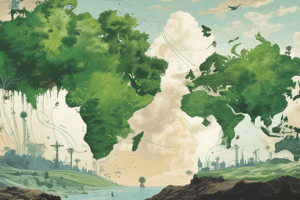Podcast
Questions and Answers
What is the primary purpose of the Bill of Rights?
What is the primary purpose of the Bill of Rights?
- To promote unrestricted government intervention in private affairs
- To grant absolute power to the government over individuals
- To ensure government powers are limited in individuals' lives (correct)
- To establish a monarchy within the legal framework
Which of the following is not categorized as a civil right?
Which of the following is not categorized as a civil right?
- Right to vote (correct)
- Right to due process
- Freedom of speech
- Freedom from involuntary servitude
Which section of Article III of the Bill of Rights is primarily concerned with the concept of life?
Which section of Article III of the Bill of Rights is primarily concerned with the concept of life?
- Section 2
- Section 3
- Section 1 (correct)
- Section 4
Which right is classified under human rights?
Which right is classified under human rights?
How do social and economic rights differ from civil rights?
How do social and economic rights differ from civil rights?
Which of the following rights ensures that individuals have the ability to gather and express their opinions collectively?
Which of the following rights ensures that individuals have the ability to gather and express their opinions collectively?
Which of the following is an example of political rights?
Which of the following is an example of political rights?
What does the right to liberty entail according to the Bill of Rights?
What does the right to liberty entail according to the Bill of Rights?
What is a primary requirement of good governance?
What is a primary requirement of good governance?
Which statement accurately describes the Constitution?
Which statement accurately describes the Constitution?
What event led to the abolition of Congress in the Philippines?
What event led to the abolition of Congress in the Philippines?
What was a significant consequence of Martial Law in the Philippines?
What was a significant consequence of Martial Law in the Philippines?
Which of the following best describes good governance?
Which of the following best describes good governance?
How is the 1987 Constitution described in terms of its enactment?
How is the 1987 Constitution described in terms of its enactment?
What concept does politics primarily concern in relation to society?
What concept does politics primarily concern in relation to society?
What societal issues influenced the declaration of Martial Law in the Philippines?
What societal issues influenced the declaration of Martial Law in the Philippines?
What does the term 'good governance' primarily emphasize?
What does the term 'good governance' primarily emphasize?
Which of the following best describes the distinction between public affairs and private life in the political context?
Which of the following best describes the distinction between public affairs and private life in the political context?
What is emphasized as a method for resolving conflict in politics?
What is emphasized as a method for resolving conflict in politics?
How does the concept of 'polis' relate to modern understandings of politics?
How does the concept of 'polis' relate to modern understandings of politics?
What role does civil society play in the political framework?
What role does civil society play in the political framework?
What does politics as 'power' primarily involve?
What does politics as 'power' primarily involve?
In the context of conflict resolution, which approach is NOT associated with politics?
In the context of conflict resolution, which approach is NOT associated with politics?
Which of the following best describes the relationship between politics and public funding?
Which of the following best describes the relationship between politics and public funding?
What is the key aspect that enables individuals with legitimate power to exert influence?
What is the key aspect that enables individuals with legitimate power to exert influence?
In what situation does reward power become significantly more effective?
In what situation does reward power become significantly more effective?
What consequence does coercive power typically create in interpersonal relationships?
What consequence does coercive power typically create in interpersonal relationships?
Which of the following examples best illustrates referent power?
Which of the following examples best illustrates referent power?
What is a primary characteristic of someone holding coercive power?
What is a primary characteristic of someone holding coercive power?
Which type of power is most effectively utilized by someone who is admired and emulated?
Which type of power is most effectively utilized by someone who is admired and emulated?
Which of the following is NOT associated with the concept of legitimate power?
Which of the following is NOT associated with the concept of legitimate power?
How can the power of rewards be negatively impacted?
How can the power of rewards be negatively impacted?
What is the primary purpose of the power of taxation?
What is the primary purpose of the power of taxation?
Which of the following best describes police power?
Which of the following best describes police power?
Which legal maxim underpins the concept of police power?
Which legal maxim underpins the concept of police power?
What condition is required for the state to exercise the power of eminent domain?
What condition is required for the state to exercise the power of eminent domain?
Which of the following is NOT considered an inherent power of the state?
Which of the following is NOT considered an inherent power of the state?
Inherent powers of the state are defined as powers that are:
Inherent powers of the state are defined as powers that are:
What is the primary objective of police power?
What is the primary objective of police power?
Which of the following best describes the inherent nature of state powers?
Which of the following best describes the inherent nature of state powers?
Flashcards are hidden until you start studying
Study Notes
Politics: Definitions and Perspectives
- Politics is the art of government or exercising control within society through collective decision-making and enforcement.
- The term originates from the Ancient Greek word "polis," meaning "city-states".
- Politics can be understood as the affairs of the "polis", or what concerns the community.
Politics as Public Affairs
- Politics involves public life or public affairs, distinguishing between the public and private spheres.
- The public sphere encompasses activities related to the state, which is the apparatus of government responsible for collective organization and funded by public money.
- Examples of the public sphere include government institutions, courts, police, the army, and social security systems.
- The private sphere consists of "little platoons" like families, private businesses, trade unions, clubs, and community groups.
Politics as Compromise and Consensus
- Politics is viewed as a means of resolving conflicts through compromise, conciliation, and negotiation rather than force.
- It's based on the idea that society is characterized by consensus rather than irreconcilable conflict.
- Conflict is seen as an inherent part of life, and politics provides mechanisms for resolution.
Politics as Power
- Politics involves the production, distribution, and use of resources within a society.
- Good governance focuses on effectiveness and efficiency, meeting societal needs and utilizing resources optimally.
- Accountability is key for good governance; governmental institutions, private sector, and civil society organizations must be accountable to the public.
The Philippine Constitution: Definition and Importance
- The Constitution is the supreme law of the land, to which all other laws must conform, and all inhabitants, including foreigners, must abide.
- It establishes, limits, and defines the fundamental powers of government.
- It distributes these powers among different branches for their safe and beneficial exercise.
Development of the 1987 Philippine Constitution
- The 1987 Philippine Constitution was influenced by the Martial Law period under Ferdinand Marcos Sr..
- In 1972, Marcos declared Martial Law, abolishing Congress and assuming all governmental powers.
- Martial Law lasted until 1981.
- The current Constitution aimed to address concerns about the concentration of power and human rights abuses under the Marcos regime.
Significance of the Bill of Rights
- The Bill of Rights safeguards individual rights and liberties from government encroachment.
- It ensures that certain aspects of a person's life, liberty, and property are beyond the reach of government power.
Classification of Rights
- Civil Rights: Rights enforced by law to protect individual happiness and enjoyment of life. Examples include: due process, freedom of speech, and protection against involuntary servitude.
- Political Rights: Rights related to participation in government, including: citizenship, suffrage, and access to public information.
- Social and Economic Rights: Rights that ensure well-being and economic security. Examples include: the right to property, just compensation, and cultural rights.
- Human Rights: Fundamental rights and freedoms enjoyed by all citizens. Examples include: the right to life, freedom from slavery, freedom of association, freedom of expression, freedom from torture, protection of privacy and family life, and freedom from discrimination.
Article III: Bill of Rights
- Article III of the Philippine Constitution outlines various fundamental rights.
- The first four sections of Article III focus on key rights:
- Right to Life, Liberty, and Property: The right to exist, freedom from restraint and servitude, and the right to use faculties lawfully. Liberty encompasses the right to contract, choose employment, and move freely.
- Right Against Unreasonable Searches and Seizures: This protects individuals from unwarranted interference with their property and privacy.
- Right to Privacy of Communication and Correspondence: This safeguards personal communications from unauthorized access and interception.
- Freedom of Expression and Assembly: This protects the right to express oneself freely and to assemble peaceably.
Sources of Power
- Legitimate Power: Power is vested in appointed or elected officials, and accepted as appropriate by those subject to it. Examples: Presidents, monarchs, and prime ministers.
- Reward Power: Influence based on providing positive outcomes to others. Examples: Raises, promotions, favorable assignments, and compliments.
- Coercive Power: Influence based on creating negative outcomes. Examples: Threats of firing, demotion, or denial of privileges.
- Referent Power: Influence stemming from admiration and respect for a person. Examples: Celebrities, charismatic leaders.
- Expert Power: Influence based on knowledge and expertise. This power is derived from the perception that someone possesses specialized knowledge and skills.
Inherent Powers of the State
- Inherent powers are not explicitly mentioned in the Constitution but are considered essential for a state's existence.
- Power of Taxation: The right of the state to impose burdens on subjects and objects within its jurisdiction to raise revenue for governmental purposes.
- Police Power: This power grants the legislature the authority to create laws for the welfare and safety of the state. It is based on the principle that the welfare of the people is the supreme law.
- Power of Eminent Domain: This right allows the state to acquire private property for public use after paying just compensation and following due process.
Studying That Suits You
Use AI to generate personalized quizzes and flashcards to suit your learning preferences.




